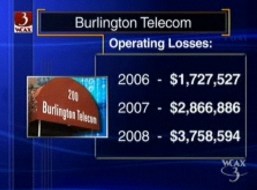 Master conspiracy theorist Glenn Beck should have written the last episode of The X Files. To think I waited nine seasons to find what truth was out there only to have screenwriter Chris Carter rip me off with a chain smoker sitting in a Native American pueblo hearing the date when “they” arrive to begin colonization. Imagine what Glenn Beck could have conjured up given the same nine years.
Master conspiracy theorist Glenn Beck should have written the last episode of The X Files. To think I waited nine seasons to find what truth was out there only to have screenwriter Chris Carter rip me off with a chain smoker sitting in a Native American pueblo hearing the date when “they” arrive to begin colonization. Imagine what Glenn Beck could have conjured up given the same nine years.
The problem with wildly-spun conspiracy theories is that you usually end up tangled in one, and Beck proved when he managed to tie his boss, Rupert Murdoch, into both a ‘Maoist -and- Marxist plot.’
To Beck, Net Neutrality and its supporters come straight out of Marxism. Beck warns “if you sit down and work with these people (Net Neutrality proponent Free Press), you might as well just go out and purchase your own blindfold and cigarette for the firing squad, because I don’t see the difference here.”
Beck slammed a Federal Trade Commission workshop he tied to Free Press, a pro-consumer advocacy group Beck considers Maoist (I didn’t realize they had the power to run government agency workshops — oh wait, they don’t), accusing the whole affair of being a conspiracy to silence free speech.
But here comes the “oops.” It turns out this very same workshop which ran Tuesday, “From Town Criers to Bloggers: How Will Journalism Survive the Internet Age,” had among its participants none other than News Corporation CEO Rupert Murdoch, who was one of the featured speakers.
Just a few weeks earlier, Beck’s attempt to slam Fox News enemy MSNBC (and its owner NBC) brought a broad indictment against too-similar-sounding messages promoting volunteerism from President Obama and the Entertainment Industry Foundation (EIF), which Beck likened to “living in Mao’s China right now,” noting NBC executive Mitch Metcalf is an “EIF board member.”
How inconvenient for Glenn that Murdoch sits on EIF’s honorary board of governors, and Fox Broadcasting is a participant in the group’s initiatives.
Meanwhile, over on RedState, the blog that bans you for fact-checking their nonsense, writer Neil Stevens just discovered the Obama Administration is working on a National Broadband Plan. That is like missing a train… that left the platform January 20th, 2009:
I’ve been held underwater by work lately and am just now catching up with this thing called “posting,” so forgive me if this post is light on links and details, but I want to give you all a heads up on what’s coming down the pipe in the Obama/Google administration. The big project after Net Neutrality is supposed to be a National Broadband Plan.
In theory, the idea of a National Broadband Plan is to give faster Internet access to more people. You see, people frequently think America “lags behind” the rest of the world because certain statistics show America to have worse Internet access than other countries. The problem with those statistics is that they don’t account for population density. A country like Japan, South Korea, or the Netherlands has a much denser, more urbanized population, and so it’s easier to run the wires you need to give them all Internet access.
But all a progressive needs is a good crisis, and they’re calling this a crisis. However, one of the proposed fixes is to give third party ISPs access to wires already laid by ISPs to provide service. Do we see how increased access to wires that already exist with service provided, doesn’t give access to people who don’t have access already?
The real motive of Julius Genachowski, Barack Obama, Google, and the rest of the adminstration’s Internet crusaders is to help freeloaders, which is why the Songwriters Guild of America is against Net Neutrality. Anyone who creates things of value on the Internet has something to lose from the Obama plans. Everyone can see this. The terrible problems with the Genachowski/Obama/Google plans are not theoretical.
 We also forgive Neil for being light on the facts. It’s not “people” that think America lags behind the rest of the world in Internet access… it’s research that proves it. Stevens must already be convinced of this, as he debates his own argument, adopting the industry position that tries to explain it all away by comparing population densities between the United States and the Asian nations beating our pants off. Yes, it is easier to run fiber optics in condominium and apartment-dense areas like Hong Kong. But the Republic of Korea and Japan have significant non-urban areas as well.
We also forgive Neil for being light on the facts. It’s not “people” that think America lags behind the rest of the world in Internet access… it’s research that proves it. Stevens must already be convinced of this, as he debates his own argument, adopting the industry position that tries to explain it all away by comparing population densities between the United States and the Asian nations beating our pants off. Yes, it is easier to run fiber optics in condominium and apartment-dense areas like Hong Kong. But the Republic of Korea and Japan have significant non-urban areas as well.
That also doesn’t explain away why Finland, Sweden, and France dramatically outpace us as well.
What all of these countries have in common is a nationally-coordinated public policy that advocates and promotes broadband deployment. The United States left it up to private providers, who promptly set up a cozy duopoly in most communities and works overtime to keep competition out of their markets. In many states, they’ve even engineered legislation to ban public broadband initiatives to provide the service they won’t. The result is an America filled with Internet access “have’s” and “have-not’s” usually defined by income, provider, or location. This isn’t an issue if you’re lucky enough to have access to FiOS, but is a major problem if your only broadband option is satellite fraudband.
The “open access” provision Stevens is alarmed about is nothing new.
Telephone companies have provided line access to third party DSL providers for at least a decade, and Time Warner Cable allows Earthlink to sell its service over their cable lines as part of an agreement originally dating back to the AOL-Time Warner merger. You’re excused if you never knew about either arrangement because most consumers don’t. The fact is, most providers don’t advertise their competition, and when they do, it’s usually because they offer a less worthwhile pricing and speed plan… or in the case of wireless data, a lousy 3G coverage map.
An even better idea for open access is to construct a modern fiber-based network to reach every American and lease it to any provider that wants to reach customers on it.
Providing access to those without broadband service doesn’t come from open access proposals. Stevens doesn’t realize the second component is Universal Service Fund reform. The USF, a small fee on phone bills to help underwrite the costs of providing phone service in rural America, has evolved into an often-abused slush fund. Reforming it to redirect resources into constructing real broadband networks for rural America that can do more than just provide phone lines would help solve the access problem Stevens brings up.
Although the fan club at RedState might represent the “everyone” Stevens claims can see the ‘truth’ about Net Neutrality, they’re not living in an “open access” community themselves. Just disagree with them and your access magically disappears.
I could write pages and pages about how the American recording industry killed itself through corporate greed, merger-mania, and treating their customer-base like criminals, but Steve Knopper did a much better job in his book Appetite for Self-Destruction, and you can listen to him interviewed at length about the subject courtesy of National Public Radio’s Fresh Air program.
Let me digress for a paragraph. Independent recording artists who’ve dealt with record labels tell a very different story than the Songwriter’s Guild — their bigger problem is getting paid fairly by the record companies themselves. Considering the recording industry has been complaining about people stealing their stuff since the days of cassette tape, arguing Net Neutrality represents ‘a pirate’s dream come true’ only exposes the true agenda of some to throttle certain broadband services not to “unclog networks” but to act as a de facto copyright control measure. That reminds me. I haven’t thanked Sony enough for foisting the infamous Sony BMG CD copy protection rootkit on us back in 2005. I’m sure plenty of virus and malware authors who followed their lead probably have.
RedState struck again on Wednesday with another under-informed piece by Neil blasting away at Net Neutrality proponent Google, which is a favorite target of those who oppose Net Neutrality.
Firstly we have the principle of neutrality itself. If Google has its way, carriers like AT&T, Comcast, Verizon, Time Warner, and the rest will not have a say at all in what its users find through their Internet connections. They will not be allowed to set network policies that favor some websites or services over others, no matter how detrimental to the company’s ability to service all its customers.
However, we can see in the case of Studio Briefing that Google is anything but neutral. Studio Briefing has been shut out of all of Google’s services, and has been forcibly removed even from the search, so searching for Studio Briefing would never turn up the company’s webpage. Rather than letting algorithms pick and choose what sites come up, as Google usually claims, somebody human took a step by removing a particular company’s site from the system and sending an email notifying the company of the situation. Imagine Google’s hysterical shrieking had AT&T wiped a Google site off of the map for all users of its services.
Firstly, Neil is unclear about what he is talking about when he suggests providers won’t have a say in what users find through their Internet connections. Is he upset they might not be able to police criticism of those companies, slow down their competitors, or block blogs? I’m waiting to hear a justification of how not being able to discriminate against websites will be detrimental to the company’s abilities to “serve its customers.”
As to Neil’s ‘Studio Briefing’ complaint, whether this represents an insidious plot by Google to censor a news aggregation site or dropping a pest site that depends on swiping other people’s content and monetizing it with Google ads is up to the reader to decide. The folks at Studio Briefing seem more concerned their AdSense account, which lets them earn advertising revenue, was shut off. The view from the other side can be read here. Of course, when I tried to Google “Studio Briefing” myself, I had no trouble finding my way there. That’s hardly being “shut out” and removed from their search engine, because I used that search engine and found my way to the site with just a few mouse clicks. Even Stevens’ Google attack is linked… by Google.


 Subscribe
Subscribe







